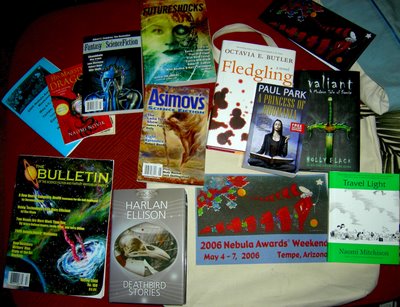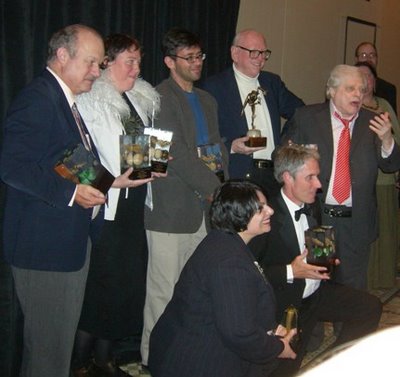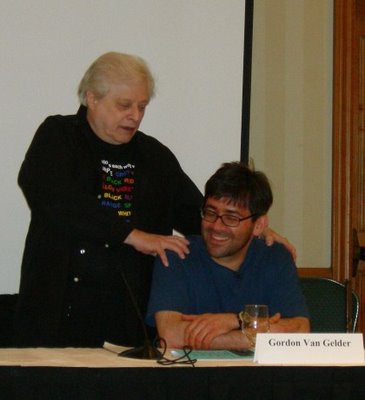My first encounter with him, aside from his books, was by mail back in 1974 or so. I wrote a fan letter, and got a reply. I asked permission to print the contents of his letter in 2-5YM, the Star Trek fanzine I edited. He agreed.
A couple of years later, on December 11th, 1976, Harlan had a speaking engagement at Syracuse University. When he first got to town, my friend Evelyn and I somehow arranged to take him out to a local German restaurant - Danzer's, I think. In attendance were Harlan, possibly his assigned go-fer (but I don't think so), Evelyn, me, and my then-boyfriend Bob. We chatted amiably about Star Trek and other subjects. That is, most of us did. Bob was throwing in zingers every few seconds, all of them directed at Harlan, for no reason other than attempted oneupmanship. I don't remember any of Bob's barbs, except for one. At one point Harlan did a Scottish burr as part of a Scotty impression. Bob made fun of it as a bad Irish brogue (which it wasn't).
Harlan had had enough. "What do you do, sir, when you're not annoying me?"
Bob said, unerepentently, "I play lawyer." Bob was indeed a lawyer.
I did my best to defuse the situation at that point, but there wasn't a whole lot I could do to make Bob behave. In this particular incident, Bob was clearly the one who was being a jerk, not Harlan. At the Clarion Writer's Workshop in 1977, Harlan explained that he's often treated like an aging gunfighter. All the young guys want to try their hand at shooting him down. The resulting showdowns then get exaggerated in endless retellings. "If I'd done a twentieth of the things attributed to me, I'd be locked up and strapped down on a gurney, like Hannibal Lector," Harlan said last night.
Nevertheless, he's not always the innocent victim of someone else's bad behavior. I had a great time seeing him Saturday, but he didn't exactly treat me with unwavering courtesy.
I arrived about 3:20 PM, having driven around Tempe for twenty minutes trying to find my way to the hotel and its parking lot. The Google map and directions had dumped me onto a street that was completely closed due to construction. Finally I got to the front of the hotel, saved myself a lot of grief by using valet parking, and walked through to the building where the meeting rooms were. I immediately spotted Harlan, sitting at a table in the vestibule, chatting with a handful of people. He looked much older and a bit heavier and frailer than the Harlan of old, but in behavior he was unchanged in his essential Harlan-ness. Yes! This was exactly what I was there for, to hang out while Harlan sat around talking.
But first I needed to pay for the privilege. I went over to the registration table at the other end of the vestibule, and paid my $50. In return I got a laminated badge with my full three-word name on it; plus a printed canvas bag full of books and magazines. Check out these goodies, easily worth the $50!

That accomplished, I walked to Harlan's table and stood on the periphery, awaiting his attention, not interrupting. He continued chatting to his friends for a minute or two. Then he turned to me and said, "What?" As in, "Who are you, and what do you want?" "I see you there quivering," he added. (Yes, he has that effect on me.) "What do you want?"
I had an answer all prepared. "Well, I haven't seen you in a couple of decades, and you're in my state," I began. I was going to add that "I thought I ought to make the drive up and say hello, and congratulations and things."
I'm pretty sure I never made it through that second sentence. When he heard that he knew me from 20 years ago, his attitude changed instantly. "Let me see your name badge," he ordered.
I leaned down, and he peered up. "Karen Funk Blocher!" he exclaimed. "If I were standing up I'd give you a hug, but as it is I'll just kiss your hand." He did so. "Didn't we exchange letters last year?"
Yes, we did, I acknowledged, about those black and white photos I found from Clarion. I told him that the photos were taken by Mike Orgill.
"I remember Mike Orgill," Harlan said.
Returning to my prepared remarks, I told Harlan that my first novel is sitting in the slush pile at Tor, that the second one is a magnificent mess, and that I have bits and pieces of others in the works.
"How long did it take you to write the first one?"
"Thirty years," I said. I knew that oversimpified answer would sound bad to him. It made me seem like a dilletante, or someone who endlessly rewrites one thing rather than moving on. But I knew he wouldn't sit through a long, defensive explanation.
"It had better be a very good book, to be worth all that time," was Harlan's comment.
I should have said that it was that good, but I was still caught up in my script. Rather than respond to his implied question, I invoked the character in Camus who had been rewriting the first sentence of a novel for 20 years. "I didn't mean to make him my role model," I said.
"There was only one Camus," Harlan said, which missed the point rather badly. Still, I thought that initial exchange went very well.
I didn't do as well with him at the only panel discussion I attended. Harlan and the editor of F&SF (The Magazine of Fantasy and Science Fiction), Gordon Van Gelder, were discussing whether the science fiction and fantasy field was getting stale, with too many writers imitating what had come before, or writing bad, unnecessary, repetitive books such as the "sixteenth volume of a fantasy trilogy." (Ouch!) When they opened the floor to questions, hardly anyone was willing to ask anything.
I decided I was not afraid.
Harlan had made an extreme claim, that no great books ever go unpublished. I brought up the fact that A Wrinkle in Time was rejected by about 23 publishers in 1960.
Harlan: Did it get published?
Karen: Yes, but--
Harlan (again): Did it get published?
Karen: Yes, but--
Harlan: It got published. Shut up.
Karen: But that's only the first half of the question! Nowadays she wouldn't have 23 different publishers to submit to.
Harlan basically said that was nonsense. He didn't want to hear my point that most of the major publishers have merged, some don't take unagented work, and so on.
Harlan: Go to the library. You remember the library, don't you?"
Karen: Yeah, the place that doesn't buy books any more. [This is pretty much true in Tucson.]
Harlan: Stop trying to argue with me. I'm smarter than you are, and I can make you cry in about 3 seconds. Go to the library, and ask for the LMP. Do you know what that is?
Karen: I don't remember what that is.
Harlan made fun of me a little more, and then said that LMP is a thick book called Literary Marketplace. He claimed that it lists a hundred pages of publishers, and called on editor Ginjer Buchanan (who was in the back row, sitting next to comic book writer and novelist Peter David) for confirmation. She agreed, but also said that the book is so expensive now that her publishing company no longer buys it.
I let it go at that point. Afterward, though, I asked Ginjer (who knows me from Quantum Leap fandom) whether I was totally wrong. She said that the truth was somewhere in between. Some of the university and regional presses do publish genre fiction, she said, but yes, the majors are mostly all conglomerates now.
So yes, theoretically one could get published by the Cactus Press, or the University of Baja Arizona Press. (I made up these publisher names.) But that doesn't sound to me like the best way to get the Mâvarin books into the world. (You knew it wasn't merely an academic question to me, didn't you? But let's not borrow trouble.) My research in Writer's Market has always indicated that the smaller presses usually have particular niches for what they put out: academic, or Christian, or books about a particular state or region, or GLBT issues, etc. Not many novels set in a fantasy world qualify under such guidelines. Mine certainly don't.
I'm not mad at Harlan over this incident, because he's like that with pretty much everyone. He publically admits that he's petty, irritable and impatient, and that these are not good qualities. Knowing he knows he does things like this makes it easier to shrug it off. Even he knows it's not me, it's him.
After the panel, people lined up for his autograph. I knew I'd missed the official autographing session, and hadn't brought anything to be signed. After all, I already have a couple of letters from him, and his autograph in at least a few books - even if I don't know precisely where most of those things are right now. But Susan Ellison, his wife of thirty years, was selling stuff by Harlan in the back of the room. I bought a cassette of Harlan reading "A Boy and His Dog" and "Repent Harlequin! Said the Ticktockman." I have the latter on LP, but no way to play it these days.
So anyway, I got in line with my purchase. There was one person behind me. After a few minutes, the woman in front of me said she'd been told that the man she replaced in line was supposed to be the last person. I decided to take my chances, since there were only two extras. But a few minutes after that, Harlan noticed me there, still 50 feet away, in line where I ought not to be. "I'm sorry, Karen," he told me, "but the line is cut off with the person in front of you. I need time to get ready for tonight."
"That's okay," I said, getting out of line. "It's not as if I don't have your autograph."
After that I sat in the hotel bar drinking three glasses of badly-needed Diet Pepsi, and reading a not-so-good short story in my free copy of F&SF. Then I went to the pre-banquet reception. Harlan wasn't there, Ginjer was busy with Connie Willis and Peter David, and the only other person I knew, event chairman and longtime Who fan Lee Whiteside, wasn't there until the very end. I sat alone at a table, thinking, and checking in with John on my cell phone. Eventually I ended up in a long conversation with another aspiring writer.
I didn't spend the extra $85 to attend the banquet, but after an hour they let the rest of us in to sit on rows of chairs in the back of the room. The lectern was in the middle of the room, and I was in the first row of seats. Even so it was much too far away to get good pictures of the proceedings. I did get about two minutes of digital video of Harlan talking, once his award came up at the end of the night.
Connie Willis was very funny as toastmaster. Nearly all of the other presenters were similarly funny, or at least interesting. Joe Haldeman won for best novel, and Joss Whedon (not present) won for best script. A couple of women I'd never heard of won three awards between them for fantasy works that sounded like something I'd enjoy.
Connie Willis pretended to end the presentation just before getting to Harlan's Grand Master award. Then she had a few remarks of her own about Harlan and his writing before turning over the microphone to two of Harlan's friends. Harlan's longtime literary agent was extremely amusing as he told exaggerated tales of Harlan's inconveniently timed phone calls, including one in which he purportedly threatened to "pull" a book because the publisher insisted on an unwanted hyphen in a particular obscene word. Neil Gaiman gave a second introduction, in which he pointed out that Harlan's writing was the reason for the award, not Harlan's public persona. Harlan's speech that followed was controversial, semi-gracious, and classic Harlan. He explained his ambivalence about the award and the organization that bestowed it, and his respect for others who had be so honored before him - Asimov, Clarke and the rest. He also told a story about Steve McQueen saving his life in the high desert. More than anything else, Harlan Ellison is a storyteller, on stage as much as on the page.

Nebula winners, 2006. At least two people pictured here
were "accepting the award for" someone not present.
were "accepting the award for" someone not present.
After that, Nebula nominees and winners posed for group photos. and I did my best to get a few decent shots. Harlan then asked Gordon Van Gelder to say a few words about him to a film crew that was making a documentary about Harlan. Van Gelder asked twice whether Harlan was joking before rising to the occasion.

I would love to have stayed for the party, but I knew it was time to drive home. I waited for my moment when I wouldn't be interrupting, and called out to Harlan. "I have a two hour drive ahead of me, but I want to say aloha and congratulations before I go."
Harlan seemed surprised by the term aloha, but didn't mention it. "Thank you, Karen. Don't drive off the road."
I thought that was nice, his expression of concern that I get home safely. "I promise. I'll drop you a line when the novel sells. It is that good, really. And thirty years ago, I promised you a dedication."
"I live for such moments," Harlan said.
If I were as quick-witted as I'd sometimes like to be, I would have replied, "Then I'll do my best to make your life worth living." But instead I just said good night, and went to retrieve my car.
Karen


4 comments:
Being able to experience things like this, are the things of great memories. :) Cool, fascinating, interesting entry. Applause, applause. This was so vivid I felt like I was there.
I'm glad you had the opportunity to get to see and speak with Harlan again!
great story telling Karn... it's best when all the information is right there! Especially so fresh in your mind.. I hope you have more opportunities like this one.
Karen, I suppose I'll have to take your word for it.. I have never read his books. But he was rude and obnoxious in his responses to you. I trust you know his better qualities (that he is a good writer), but does that allow him to display bad manners in public? Shut Up? indeed. I think you handled yourself quite well, considering the giant you were facing. At least you got a few pictures, the bag of books, and the experience of having discussed publishing issues. I think you were brave to stand up and tell him what you thought. He will not forget this meeting. Seems he has a very sharp memory, to match his cutting wit. I'm proud of you, Karen! Glad you got to see him again. I know he's one of your favorites. What do you recommend I start with as a first time Ellison reader, then? Bea
*snort* Classic! I'd say you got your $50 worth. Nice goodie bag!
Post a Comment